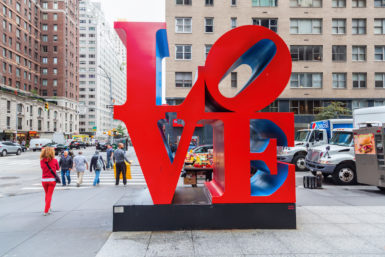[ad_1]

Robert Indiana’s LOVE sculpture in Midtown Manhattan with unidentified people.
CHRISTIAN MUELLER/SHUTTERSTOCK
The year-long case surrounding the rights to Robert Indiana’s Pop art sculptures saw a new development in the United States District Court earlier this week.
On Monday, Judge Analisa Torres dismissed five of eight counterclaims made against the Morgan Art Foundation, which represented Indiana for more than 30 years. The Morgan Art Foundation filed its initial complaint against Michael McKenzie, founder of American Image Art, and Jamie Thomas, the artist’s assistant and caretaker, in May 2018.
The lawsuit, which was filed the day before Indiana’s death last year, alleged that Thomas and McKenzie “scheme[d] to isolate Indiana, obscure the true authenticity and ownership of his works, and reap the profits from selling unauthorized and forged works that has escalated and continues to this day.” Both Thomas and McKenzie have denied the accusations.
One of the counterclaims leveled by the Estate of Robert Indiana that was subsequently dismissed focused on the Morgan Art Foundation’s payments to to the artist. The estate, which is represented by James Brannan, had claimed the foundation did not pay the artist royalties, and that the foundation did not have the right to fabricate reproductions of Indiana’s works.
The court is still waiting to hear evidence related to a series of LOVE sculptures made with semiprecious stones like marble and granite, which the estate says the Morgan Art Foundation did not have right to fabricate. The estate claimed that Simon Salama-Caro, an adviser for the Morgan Art Foundation, was not granted approval from Indiana to produce the semiprecious stone sculptures.
In a statement to ARTnews, Luke Nikas, a partner at Quinn Emanuel Urquhart & Sullivan who represents the Morgan Art Foundation, said, “The Estate has repeatedly and recklessly claimed that Morgan Art Foundation underpaid Indiana. We are thrilled that the Court rejected the Estate’s false statements and dismissed the bulk of its case. This is precisely the outcome that should be expected when an Estate that knows virtually nothing about the artist or his art tries to rewrite history.”
On the subject of the semiprecious stone sculptures, Nikas said, “Morgan had a contract with Indiana that covered these works, and Simon Salama-Caro spoke repeatedly with Indiana about them. We even have photographs of Indiana himself with one of these sculptures in his home; he owned it and proudly displayed it. We expect to prevail on this claim, and the few remaining issues, once the court is permitted to consider the facts.”
Documents in the case refer to various agreements between the Morgan Art Foundation and Indiana. In an agreement from April 1999, Indiana transferred the intellectual property rights of certain works—LOVE, AHAVA, AMOR, Numbers, and YALE—to the plaintiff. An agreement in December of that same year between the artist and the Morgan Art Foundation gave the plaintiff the exclusive right to produce and fabricate the LOVE sculptures as well as those titled AHAVA, AMOR, Numbers, ART, and 2000.
Both agreements stipulated that the plaintiff was required to pay Indiana a percentage of the profits it received from licensing and selling the works, and, in 2004, Indiana expanded the 1999 agreement to include “all paintings and sculptures conceived by Indiana from 1960 through the date of the amendment.”
Reached by ARTnews, Brannan disputed the dismissal of the estate’s counterclaims. “This ruling does not address the merits of our claims,” he said. “Since filing our first lawsuit we have discovered more about the ways Morgan Art and Simon Salama-Caro breached their contracts with Robert Indiana, including self-dealing and breach of fiduciary duties owed to Robert Indiana.”
Judge Torres also denied a request by McKenzie, the American Image Art founder, to suspend legal proceedings pertaining to the Morgan foundation’s allegation that he attempted to sell $30 million worth of Indiana forgeries.
Nikas, the Morgan foundation’s lawyer, said he believes the case will go to trial sometime next year.
ARTnews has reached out to American Image Art and John Frumer, who represents Jamie Thomas, for comment.
[ad_2]
Source link

